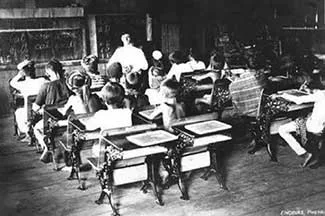Batangas Students Make History as the 1st School Ordered Closed in the American Colonial Era
On the lighter side of history, from Volume 491 of the Woodstock2 Letters, a publication of the Society of Jesus from 1872 to 1969, we find an example of the sort of “amusing” notoriety that the Batangueño can be capable of. The word “amusing” is used in the context of the present day, as there could not have been anything amusing about the incident at the time events were unfolding.
Volume 49 was published in 1920, so the incident described in this article must have occurred that same year or the immediate years preceding it. The details of the incident were taken from an article published in an issue of the Manila Daily Bulletin – as the present-day newspaper Manila Bulletin3 was known from 1906 to 1972.
The article was titled “Insubordination Closes School” and from it we take verbatim some excerpts:
“For the first time in the history of the Philippine Public School System (the so-called “Philippine Commission” established by the United States tried to install a public school system4 as early as 1901), a provincial public high school has been ordered closed by authority of the governor general (this was Francis Burton Harrison5, Governor General of the Philippines from 1913 to 1921) because of continued insubordination on the part of pupils.”
“Acting on authority of the chief executive, Acting Secretary of Public Instruction Albert yesterday morning sent to Batangas a rush telegram ordering immediate closing of the provincial high school there. How long the closing order will remain in effect is not known, officials concerned contenting themselves with the statement that it is ‘indefinite’.”
The acting secretary mentioned in the article was one Dr. Alejandro Albert, the “first Filipino Undersecretary of Public Instruction.” Apart from being an educator, he was also a colonel in the army. Because he possessed a Licentiate in Pharmacy from UST, he was assigned to the medical corps. In 1903, he founded the Manila College of Pharmacy6.
Albert’s closure of the school came after a string of “unpleasant incidents demonstrating the insubordination of Batangas high school pupils.” The article resumed:
“This insubordination has been evidenced in a number of ways, say local officials. One favorite trick of students who were not satisfied with their grades or who had conceived a dislike for a particular teacher, was to spatter his or her back with ink while passing down the aisle on inspection. Some of the lady teachers, it is stated, have had gowns ruined in this manner.”
“The conditions in Batangas at length became so intolerable that Governor General Harrison, after ascertaining the facts, approved the immediate closing of the school, and it is not believed that the people of Batangas will secure the opening until sufficient guarantees are forthcoming as to the future behavior of the students. Fay H. Roberts is principal of the high school in Batangas, and the entire school system of the province is under supervision of Division Superintendent Wagenblass.”
At this point, we try to place these incidents in the proper perspective. One has to bear in mind that the circumstances with which the United States took possession of the Philippines from Spain were not all immediately acceptable to Filipinos, and most especially to Batangueños, who continued to resist American rule after all the other provinces had given up.
The Americans were, therefore, anxious for the new public school system to work because it was one of their justifications for their “benevolent occupation” of the Philippine Islands. Seen in this light, therefore, disturbances in a school – and in Batangas, of all places – was indeed a big deal.
Finally, the Jesuit priest John J. Thompkins, in his “Notes from Vigan” (also part of Volume 49 of the Woodstock Letters) tried to explain the root of the insubordination:
“The system is perhaps much to blame, as respect for authority is not sufficiently inculcated in the schools. Sometimes, the American teachers themselves are not of the character to command respect, and at times, the conduct of some does not merit the respect of the student. The bureau does not want, if possible, young lady American teachers, and incidentally, I would advise any young lady, wishing to come to teach, to stay at home.”
2 The name “Woodstock” was taken from Woodstock College, the Jesuit seminary in Maryland where the journal was published. “The Woodstock Letters,” online at the St. Louis University Libraries Digital Collections.
3 “Manila Bulletin,” Wikipedia.
4 “Education in the Philippines,” Wikipedia.
5 “Francis Burton Harrison,” Wikipedia.
6 “Dr. Alejandro Albert 1869-1936, a Biographical Sketch,” online at Dr. A. Albert Elementary School.

